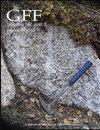Marine and terrestrial invertebrate borings and fungal damage in Paleogene fossil woods from Seymour Island, Antarctica
IF 1.2
4区 地球科学
Q2 GEOLOGY
引用次数: 7
Abstract
ABSTRACT An assemblage of permineralized conifer and angiosperm woods collected from Paleogene marine strata on Seymour Island during the Swedish Antarctic expedition of 1901–1903 includes many specimens with internal damage caused by an array of xylophagous organisms. Short, broad, clavate borings referable to Gastrochaenolites clavatus are attributed to pholadid bivalves. Elongate borings with carbonate linings referable to Apectoichnus longissimus were produced by teredinid bivalves. Slender, cylindrical tunnels cross-cutting growth rings and backfilled in meniscoid fashion by frass composed of angular tracheid fragments were probably produced by a terrestrial beetle borer. They are most similar to tunnels generated by modern cerambycid and ptinid coleopterans. Less regular, spindle-shaped cavities and degraded zones flanking growth rings are similar to fungi-generated modern white pocket rot. Larger chambers in the heartwood referable to the ichnotaxon Asthenopodichnium lignorum were produced by an alternative mode of fungal degradation. The biological interactions evident in the fossil woods illustrate additional terrestrial trophic levels enhancing the known complexity of ecosystems on and around the Antarctic Peninsula shortly before the initial pulse of mid-Cenozoic glaciation in Antarctica that caused extirpation of the majority of plants and animals in that region.南极洲西摩岛古近系化石林中的海洋和陆地无脊椎动物钻孔和真菌损害
1901-1903年瑞典南极考察期间,在西摩岛古近系海洋地层中采集了一组过矿化针叶树和被子植物,其中许多标本受到一系列食木生物的内部损伤。短的,宽的,棒状的钻孔是指腹脉绿石棒状的,属于双壳类。带有碳酸盐衬里的细长钻孔是由双壳类动物生产的。细长的圆柱形隧道,横切生长环,由角管状碎片组成的杂草以半月板形式回填,可能是由陆生蛀虫形成的。它们与现代天牛类和松毛虫类鞘翅目动物形成的隧道最为相似。较不规则的纺锤形空腔和生长环两侧的退化区类似于真菌产生的现代白色袋腐病。与Asthenopodichnium lignum相关的心材中较大的腔室是由真菌降解的另一种模式产生的。化石森林中明显的生物相互作用表明,在南极洲中新生代冰川初始脉冲导致该地区大多数动植物灭绝之前不久,额外的陆地营养水平增强了南极半岛及其周围生态系统的已知复杂性。
本文章由计算机程序翻译,如有差异,请以英文原文为准。
求助全文
约1分钟内获得全文
求助全文
来源期刊

Gff
地学-地质学
CiteScore
2.80
自引率
10.00%
发文量
11
审稿时长
>12 weeks
期刊介绍:
GFF is the journal of the Geological Society of Sweden. It is an international scientific journal that publishes papers in English covering the whole field of geology and palaeontology, i.e. petrology, mineralogy, stratigraphy, systematic palaeontology, palaeogeography, historical geology and Quaternary geology. Systematic descriptions of fossils, minerals and rocks are an important part of GFF''s publishing record. Papers on regional or local geology should deal with Balto-Scandian or Northern European geology, or with geologically related areas. Papers on geophysics, geochemistry, biogeochemistry, climatology and hydrology should have a geological context. Descriptions of new methods (analytical, instrumental or numerical), should be relevant to the broad scope of the journal. Review articles are welcome, and may be solicited occasionally. Thematic issues are also possible.
 求助内容:
求助内容: 应助结果提醒方式:
应助结果提醒方式:


